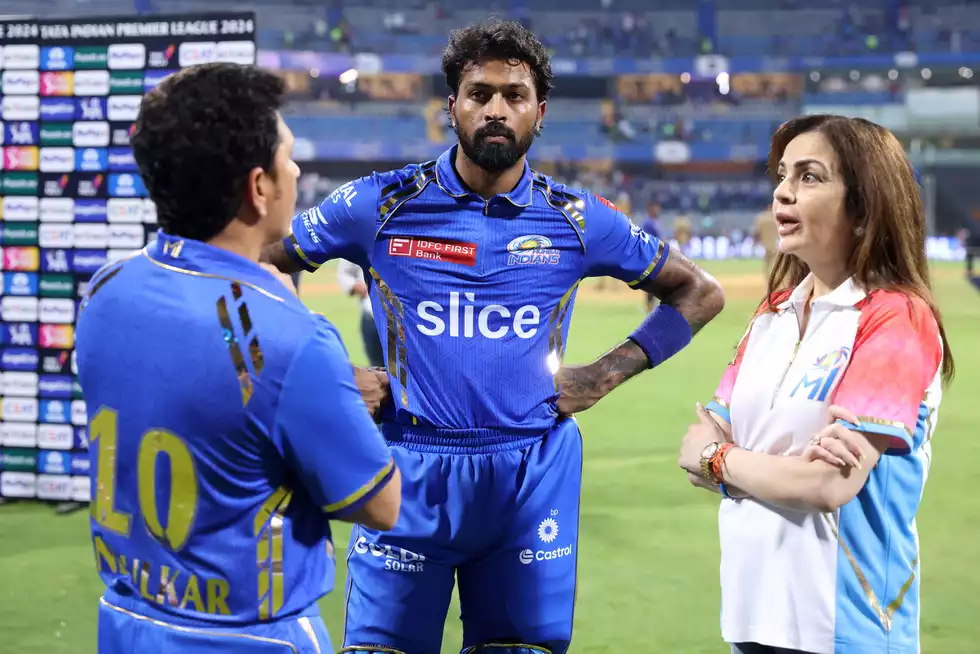It’s evident from Kieron Pollard that Hardik Pandya still has access to the Mumbai Indians’ changing room. However, it is also evident that Pandya has lost the Wankhede. According to conventional thinking, winning is the magic bullet that will bring back the fans. It may take more than that in Pandya’s case.
Mumbai has dropped four of its six IPL games so far this season. Royal Challengers Bangalore have lost six of their last seven games, as have the Punjab Kings and Delhi Capitals. Even so, unlike Pandya at the Wankhede and, to a lesser extent, anywhere else he plays, Shikhar Dhawan, Rishabh Pant, and Faf du Plessis are not routinely and harshly jeered at Mullanpur, the former Kotla, and the Chinnaswamy.
At India’s World Cup matches last year, anytime the opponent did something to shout about, the crowd fell into a spooky silence. Outsiders thought that was strange. Could it be attributed to youth? Or was it a sign of a larger problem with exceptionalism? In any case, quiet would be preferable to Pandya being picked out by fans of other teams as well as those of his own. Pollard described himself as “sick and fed up” with his captain’s behavior.
When Pandya approached the middle for the toss on Sunday, the unsightly phenomena escalated into ugly behavior at the Wankhede. And that three days prior, after he had shared a noteworthy partnership of 60 off 32 with Tim David, and after he had scored an undefeated 21 off six balls four days earlier. each of those matches took place at the Wankhede, with Mumbai emerging victorious in each, thanks in large part to Pandya. Yet, the audience treated Pandya rudely when they saw him for the first time after that.
The amount of applause he received from the crowd when he hugged MS Dhoni during the teams’ pre-match warm-up was insignificant in comparison to the cheers that greeted Pandya when he came out to toss. Was Dhoni the only one making that noise? The loud applause for Dhoni’s hat-trick of sixes off Pandya in the final over of the Chennai Super Kings’ innings provided the answer to that query. Of course, Dhoni is Dhoni; he appears to be a hero to everyone who watches him play. It was hard to tell how much of the standing ovation was appreciation for Dhoni and how much was joy at Pandya’s misfortune.
On Cricbuzz, Adam Gilchrist presented a convincing case for why this is taking place. “A victim of their own success” is what he suggested may happen to teams like Mumbai, who have won five of the 16 IPL championships. Their fans were hoping for more than six games played and four losses.
Particularly when the captain, who guided the squad to five championships, is out there in the open. Still standing, Rohit Sharma is one of three players with a century after 30 games and ranks fourth overall in the tournament’s run scorers. Was Mumbai’s success also a victim of Sharma’s leadership? Since 2020, they have failed to win the IPL or even make it to the final. Three years without a trophy at the Wankhede is a very lengthy time compared to other venues.
And then there’s Dhoni, who seems to go on forever. He has guided his side to five IPL titles, just like Sharma. In contrast to Sharma, Dhoni’s decision to resign as captain has coincided with a reality that is exactly the opposite of Mumbai’s: CSK has played six games and won four.
“There’s a man behind the stumps [Dhoni] who tells them [CSK] what’s working, that helps,” Pandya remarked following Sunday’s game. Gilchrist interpreted it as suggesting that Pandya could not be “feeling that he has got support around him.” It’s hard to ignore the possibility that Pandya believes Sharma does not support him in the same manner that Dhoni, as CSK’s new captain, appears to support Ruturaj Gaikwad. From this, another story within this one is hung.
Pandya was parachuted into the Wankhede from Gujarat Titans, who Pandya guided to the title in 2022, when Sharma’s Mumbai ended stone last. In contrast to Gaikwad, who has played for CSK solely since 2020. Gujarat defeated Mumbai in qualifier 2 to advance to the final under Pandya last year.
Pandya is as Gujarati as they come, having been born in the Surat district’s Choryasi. However, from 2015 to 2021, he participated in his first 92 IPL matches with Mumbai, where he was a member of four of their winning teams. However, Pandya was released by Mumbai prior to the player auction for 2022, during which Pollard, Suryakumar Yadav, Jasprit Bumrah, and Sharma were kept. Pandya was purchased by Gujarat for USD 1.9 million, also before to the 2022 auction.
After spending two seasons with Gujarat, what does the ingrate do? Request to be sent back to Mumbai! That was it, if there was any way to bring himself any lower in the eyes of the Wankhede faithful. Even worse, it was the last straw that led to Sharma being removed as captain. There will be jeers as Pandya raises the trophy to celebrate Mumbai’s IPL victory.
From the tip of Africa, here is an attempt to analyze the Pandya problem. If you’re Indian, you may wonder why this basically domestic dispute would be of interest to people elsewhere. Because, if the IPL ever was an indigenous event at all, it has long since burst its banks. Four Australians, two South Africans, a Pakistani, and a New Zealander (Brendon McCullum, who scored 158 off 73) participated in the first match, which took place at the Chinnaswamy in April 2008.
The IPL is so ingrained in the culture of contemporary cricket in the nations where the game is played—not to mention that these nations produce many of the top players in the competition—that Pandya’s situation has been noticed by one of the most serious print magazines in the world.
The headline above 926 words on the topic, “Are Indians right to boo Hardik Pandya, a star cricketer?” appeared in The Economist on Friday. “Mr. Pandya’s first transgression was joining the Mumbai Indians instead of the Gujarat Titans by jumping ship. The fans of Mr. Pandya, who is a Gujarati, became enraged with him for his action. However, Mr. Pandya allegedly demanded that he take Rohit Sharma’s place as the captain of his new team in exchange for the hefty offer. The opportunistic move against their wildly successful leader was viewed by Mumbai Indians supporters as treasonous.”
That “allegedly” about Mumbai’s change in captain is putting in a lot of work. Such decisions are not made by mere players, not even by the rich elite that the IPL has spawned. The billionaires who own them are entitled to that. Forbes, another completely non-frivolous newspaper, estimates that Mukesh Ambani alone is worth USD115.4 billion. Accordingly, the rumour that Pandya “insisted” on becoming captain cannot be taken seriously.
However, in another part of the article, The Economist was spot on: “A lot of sports fans view themselves as defenders of their sport’s unwritten moral code, not the referees, club owners, or players. Their preferred method of communicating and punishing infractions is booing.”
Including, regardless of who owns what, offenses seen by those who see themselves as defenders of the faith. Accommodating Pandya may come at a cost that even billionaires are unable to bear.

